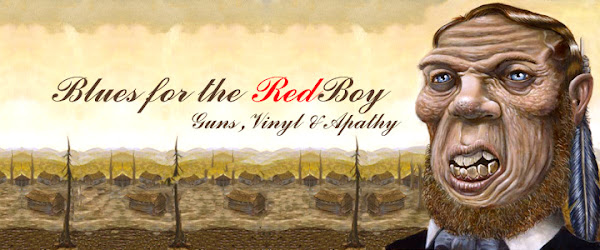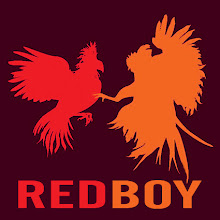
The missing link of the "Missing Link"?
Contrary to popular belief, the blues is just pop music. I know, I know, I wanted it to mean something more too, but the blues was only ever a copy of a copy of a copy; like a copper engraving, it’s most indelible imprint begun earlier in it's material life, time and sentimentality having worn the crisp quality of that negative space down to the point where both depth and shadow are now flat with the fatigue of a thousand lesser works. Even in its day the blues was derivative and suffered from the same hobgoblins of every artistic endeavor, mainly that it was never an artistic endeavor to begin with – it was always ever about money. And why shouldn’t it have been? Slavishness to authenticity is, after all, a modern contrivance, and besides, a man’s got to live and eat and those things tend to work themselves out - more often than not - with a guitar in one's hand.

While the whole of the genre is eminently listenable, there are fleeting moments that defy convention, moments where we recognize innovation at work within inspiration, much like the Devil who mixes lies with the truth in the interests of enticing one to swallow the former at the insistence of the latter.
True: Robert Johnson’s Love in Vain shares more than a passing resemblance to Joshua White’s When the Sun Goes Down (pre hand injury), but I submit that it is not Johnson’s implied devilry which is noteworthy (Blues has always ever courted superstition and, likewise, minorities were ever associated with witchery), but the fact that Johnson - by 1937 - had improved upon the mechanics of his contemporaries to the point where by the time of his untimely death he had effectively whipped the medium till the butter came. Can anybody truly say that the medium as been improved upon since Johnson’s time?

Similarly, If
Emmett Miller had only taken hokum to its logical conclusion, namely that anachronistic collision with the jazz age presaged by the success of his contemporaries, then he would have truly been relegated to the dustbin that is ignominious death, but as we are talking about him now in glowing superlatives it is apparent that Miller survived the grist mill that is pop music and came out the other side intact, lauded even. Why? After all, the man was a Blackface Minstrel, and as such, propriety dictate his legacy be chiseled off of every obelisk of cultural relevance - a heretic.
Miller's voice, for one - his is an instrument which is free in a way that most people could never be. Intoned as much as the words are sung, each vowel is impregnated with the kind of emotion which, though undeniably melodramatic, is capable of dragging even the most sentimental claptrap to the kind of lofty heights which betray the limited scope of late 19th / early 20th century balladry.
My experience with Miller begins, as most do, over whiskey and beers, “Hey, did you ever hear the earlier version of Love Sick Blues that Hank William ripped off”, a half-truth which, as an avowed Hiram Williams fan, was bound to elicit a curiosity beyond what one might deem as healthy (Thanks Peter). What's more, it changed the way I looked at music. It was no longer a question of authenticity (There's that word again) , but an elliptical undercurrent of repeating motifs transcending race and nationality. Motifs which have shamelessly been passed off as contemporary but, in reality, belong to no one author - like the elemental formula for oxygen, the very spirit of public domain.

Jump ahead several years to an unassuming Saturday morning at a local junk shop, a veritable Kingdom of the Spiders stinkin' to high heaven of kerosene and promise. After several hours diggin' I had managed to amass a small stack of 78s, slick with white mold but otherwise unremarkable save for a pair of Sugar Chile Robinson discs. It seems strange now, but were it not for the rusty math of the elderly caretaker tallying up my spoils, I might not have wandered off into the periphery and chanced a sealed box containing what were otherwise Caruso and Wagner discs, a heavy stack upon who’s top brazenly sat a near mint copy of Okeh 40329, Emmett Miller and Walt Rothrock performing Anytime and Pickaninnies’ Paradise. All told, the record cost me a dollar - the last fair deal gone down.
Cut in 1924, this disc is a long way from Ashville, NC, though if I had to hazard a guess I would say Miller’s patronage of RCA’s Camden recording studio during the 20’s and a rumored engagement at Atlantic City’s Steel Pier might just account for the 78’s appearance this far north. Regardless, it’s a small miracle considering up until ten years ago this record was thought not to exist at all (Famously omitted from Columbia’s Miller retrospective as no copies could be located), and even now, conventional wisdom numbers those copies still in existence at three.
Concerning the quality of the performance, I’ll let the music speak to its own strength. As to what I take away from Miller and the strange circumstances of his posthumous celebrity? Simple, history is a complicated and ugly thing, but no more so than it's authors. One day someone will pick through your wreckage having not known the particulars of your circumstances. If you would have them give you the benefit of the doubt then you owe your contemporaries and, likewise, the contemporaries of your heroes, nothing less.
Anytime – Emmett Miller (featuring Walt Rothrock)
Picanninnies’ Paradise – Emmett Miller (featuring Walt Rothrock)
















